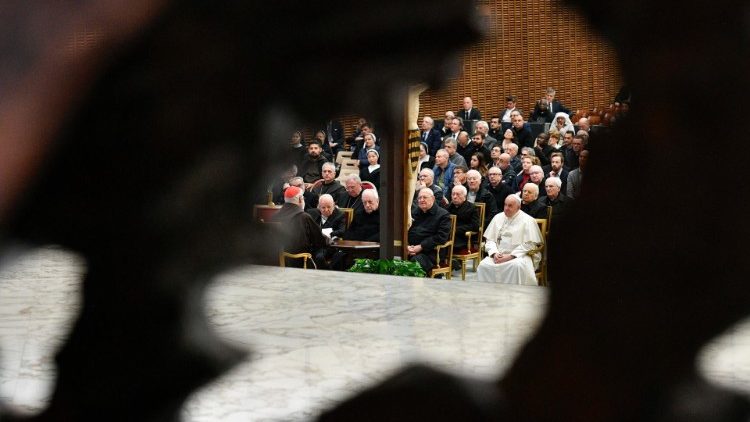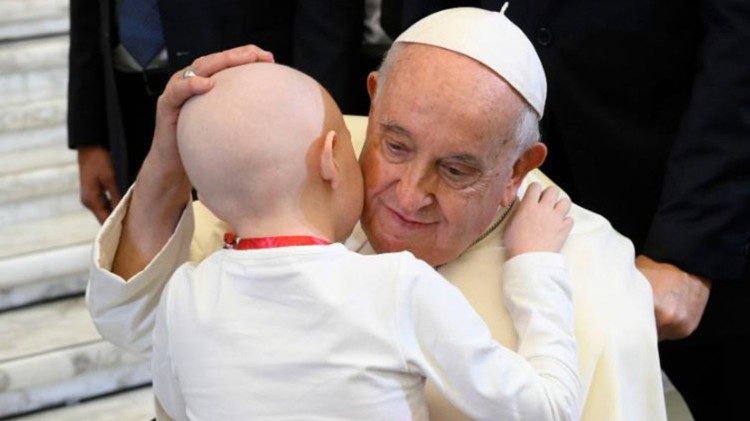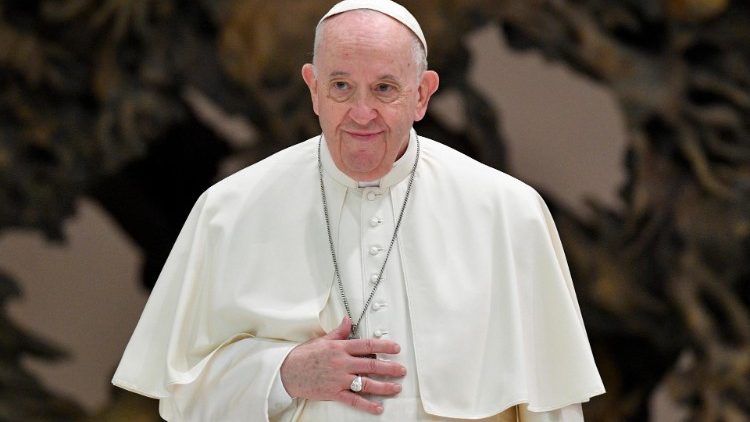Pope Francis’ Message for Lent 2025: A Call to Conversion and Solidarity
He invites Christians to deepen their faith, live fraternity and hope in difficult times

Lent 2025 comes with a deeply inspiring message from Pope Francis, who in his traditional letter for this time of reflection, invites us to conversion, solidarity, and the rediscovery of hope in adversity.
The Pope begins his message by highlighting the call that Lent makes to all Christians: a time of penance and renewal, in which we seek to achieve true freedom in Christ. Francis reminds us that this is an opportunity to look within and reflect on our relationship with God and with others, seeking a conversion that is not superficial, but that reaches the depths of our being.
In his reflection, the Pope places special emphasis on the importance of prayer and fasting, two fundamental pillars of Lent. These acts of penance are not just an individual exercise, but a way of opening ourselves to the needs of others. “Prayer, which leads us to a contemplation of the word of God, must lead us to action; fasting must be lived as an act of solidarity with those who suffer.”
Solidarity, as Francis points out, must not be just a word, but a daily practice. The Pope stresses the need to be attentive to the needs of others, especially in a world marked by inequalities. In this sense, Lent becomes a time to make concrete commitments to help those most in need. “True fasting,” the Pope affirms, “is that which is carried out by opening our hearts to others, especially the poorest.”
Finally, Pope Francis concludes his message with a call to hope. In the midst of the challenges facing humanity, he invites Christians not to lose trust in God, who is always faithful to his promises. Lent, he reminds us, is not only a time of sacrifice, but also of hope in the resurrection, the culminating moment of our faith.
This time of Lent, according to Pope Francis, must be lived intensely, making us instruments of peace, fraternity and justice. A time to rediscover the beauty of the Gospel, to transform our lives, and to draw closer to God and our brothers and sisters.
Full Text:
Let us walk together in hope
Dear brothers and sisters,
We begin our annual pilgrimage of Lent in faith and hope with the penitential rite of the imposition of ashes. The Church, our mother and teacher, invites us to open our hearts to God’s grace, so that we can celebrate with great joy the paschal victory of Christ the Lord over sin and death, which led Saint Paul to exclaim: “Death has been swallowed up in victory. Where, O death, is your victory? Where, O death, is your sting?” ( 1 Cor 15:54-55). Indeed, Jesus Christ, crucified and risen, is the heart of our faith and the pledge of our hope in the Father’s great promise, already fulfilled in his beloved Son: life eternal (cf. Jn 10:28; 17:3). [1]
This Lent, as we share in the grace of the Jubilee Year, I would like to propose a few reflections on what it means to journey together in hope, and on the summons to conversion that God in his mercy addresses to all of us, as individuals and as a community.
First of all, to journey. The Jubilee motto, “Pilgrims of Hope”, evokes the lengthy journey of the people of Israel to the Promised Land, as recounted in the Book of Exodus. This arduous path from slavery to freedom was willed and guided by the Lord, who loves his people and remains ever faithful to them. It is hard to think of the biblical exodus without also thinking of those of our brothers and sisters who in our own day are fleeing situations of misery and violence in search of a better life for themselves and their loved ones. A first call to conversion thus comes from the realization that all of us are pilgrims in this life; each of us is invited to stop and ask how our lives reflect this fact. Am I really on a journey, or am I standing still, not moving, either immobilized by fear and hopelessness or reluctant to move out of my comfort zone? Am I seeking ways to leave behind the occasions of sin and situations that degrade my dignity? It would be a good Lenten exercise for us to compare our daily life with that of some migrant or foreigner, to learn how to sympathize with their experiences and in this way discover what God is asking of us so that we can better advance on our journey to the house of the Father. This would be a good “examination of conscience” for all of us wayfarers.
Second, to journey together. The Church is called to walk together, to be synodal. [2] Christians are called to walk at the side of others, and never as lone travellers. The Holy Spirit impels us not to remain self-absorbed, but to leave ourselves behind and keep walking towards God and our brothers and sisters. [3] Journeying together means consolidating the unity grounded in our common dignity as children of God (cf. Gal 3:26-28). It means walking side-by-side, without shoving or stepping on others, without envy or hypocrisy, without letting anyone be left behind or excluded. Let us all walk in the same direction, tending towards the same goal, attentive to one another in love and patience.
This Lent, God is asking us to examine whether in our lives, in our families, in the places where we work and spend our time, we are capable of walking together with others, listening to them, resisting the temptation to become self-absorbed and to think only of our own needs. Let us ask ourselves in the presence of the Lord whether, as bishops, priests, consecrated persons and laity in the service of the Kingdom of God, we cooperate with others. Whether we show ourselves welcoming, with concrete gestures, to those both near and far. Whether we make others feel a part of the community or keep them at a distance. [4] This, then, is a second call to conversion: a summons to synodality.
Third, let us journey together in hope, for we have been given a promise. May the hope that does not disappoint (cf. Rom 5:5), the central message of the Jubilee, [5] be the focus of our Lenten journey towards the victory of Easter. As Pope Benedict XVI taught us in the Encyclical Spe Salvi, “the human being needs unconditional love. He needs the certainty which makes him say: ‘neither death, nor life, nor angels, nor principalities, nor things present, nor things to come, nor powers, nor height, nor depth, nor anything else in all creation, will be able to separate us from the love of God in Christ Jesus our Lord’ ( Rom 8:38-39)”. [6] Christ, my hope, has risen! [7] He lives and reigns in glory. Death has been transformed into triumph, and the faith and great hope of Christians rests in this: the resurrection of Christ!
This, then, is the third call to conversion: a call to hope, to trust in God and his great promise of eternal life. Let us ask ourselves: Am I convinced that the Lord forgives my sins? Or do I act as if I can save myself? Do I long for salvation and call upon God’s help to attain it? Do I concretely experience the hope that enables me to interpret the events of history and inspires in me a commitment to justice and fraternity, to care for our common home and in such a way that no one feels excluded?
Sisters and brothers, thanks to God’s love in Jesus Christ, we are sustained in the hope that does not disappoint (cf. Rom 5:5). Hope is the “sure and steadfast anchor of the soul”. [8] It moves the Church to pray for “everyone to be saved” ( 1 Tim 2:4) and to look forward to her being united with Christ, her bridegroom, in the glory of heaven. This was the prayer of Saint Teresa of Avila: “Hope, O my soul, hope. You know neither the day nor the hour. Watch carefully, for everything passes quickly, even though your impatience makes doubtful what is certain, and turns a very short time into a long one” ( The Exclamations of the Soul to God, 15:3). [9]
May the Virgin Mary, Mother of Hope, intercede for us and accompany us on our Lenten journey.
Rome, Saint John Lateran, 6 February 2025
Memorial of St Paul Miki and Companions, martyrs.
FRANCIS
__________________________
[1] Cf. Encyclical Letter Dilexit Nos (24 October 2024), 220
[2] Cf. Homily for the Mass and Canonization of Giovanni Battista Scalabrini and Artemide Zatti, 9 October 2022
[5] Cf. Bull Spes Non Confundit, 1.
[6] Encyclical Letter Spe Salvi (30 November 2007), 26
[7] Cf. Easter Sequence
[8] Cf. Catechism of the Catholic Church, 1820
Related

The Best Quotes from Pope Francis During His Pontificate
Exaudi Staff
22 April, 2025
3 min

Pope Francis dies of stroke and irreversible cardiovascular collapse
Exaudi Staff
22 April, 2025
1 min

More than a Decade of Service, Reform, and Hope
Exaudi Staff
21 April, 2025
4 min

The Pontificate of Pope Francis: A Leadership of Compassion and Renewal for the Church
Exaudi Staff
21 April, 2025
3 min
 (EN)
(EN)
 (ES)
(ES)
 (IT)
(IT)

